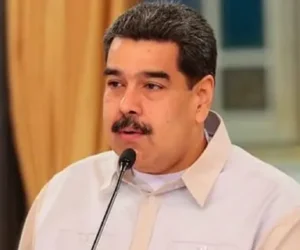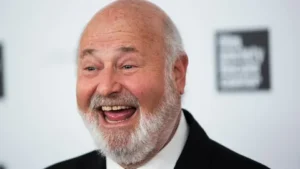BREAKING NEWS (November 14, 2025): President Bola Tinubu has just reappointed Brigadier-General Mohammed Buba Marwa as NDLEA Chairman for another five-year term, extending his leadership until 2031. This reappointment confirms what many already knew – Marwa has transformed Nigeria’s drug enforcement agency from a largely ineffective organization into a formidable force that’s arrested over 73,000 suspects and seized more than 15 million kilograms of drugs.
Look, when you talk about Buba Marwa, you’re talking about one of Nigeria’s most effective public servants across multiple decades and regimes. This is a man who served under military dictators, governed two of Nigeria’s most challenging states, earned dual master’s degrees from Pittsburgh and Harvard, survived assassination attempts, and is now leading Nigeria’s most aggressive war on drugs. That’s not just a career – that’s a masterclass in adaptability and effectiveness.
I’m going to walk you through the complete story of Mohammed Buba Marwa CON, OFR – from his birth into a military family in 1953, through his distinguished army career, his transformative governorships of Borno and Lagos States, his brief political career, and his remarkable tenure at NDLEA where he’s completely changed the game on drug enforcement. This is the biography of a man who gets things done, regardless of who’s in power.
The Military Family Legacy: Born to Serve
Mohammed Buba Marwa was born on September 9, 1953, in Kaduna, Northern Nigeria, into a family where military service was tradition, not choice. His father, Buba Marwa, served in the Nigerian Army. His grandfather, Buba Yola, also served in the army. For the Marwa family, serving Nigeria in uniform wasn’t just a job – it was heritage.
Growing up in Kaduna in the 1950s and 60s meant witnessing Nigeria’s most turbulent period: independence in 1960, the first military coup in 1966, the counter-coup, the pogrom against Igbos, and ultimately the Biafran War (1967-1970). Young Buba was between 13 and 17 during the civil war – formative years that would shape his understanding of Nigeria’s fragility and the importance of strong leadership.
His primary education took him across Nigeria – Enugu, Zaria, Abeokuta, and Lagos (1960-1965). This constant movement was typical of military families who relocated with postings. But it gave young Buba something valuable: exposure to Nigeria’s diversity and an understanding of different regions and cultures. That cross-regional perspective would serve him well when governing Borno and Lagos.
The Making of a Soldier: NMS and NDA
In 1966, at just 13 years old, Buba Marwa gained admission to the Nigerian Military School (NMS) in Zaria. The NMS wasn’t just any secondary school – it was (and remains) Nigeria’s premier military secondary institution, designed to produce future military leaders.
Think about what that means: from age 13 to 17, during Nigeria’s civil war and its aftermath, Marwa was being trained in military discipline, leadership, and strategy. The NMS curriculum combined rigorous academics with military training. Students learned to march, follow orders, lead peers, and understand military hierarchy while also completing secondary education.
He graduated from NMS in 1970, the same year the Biafran War ended. Nigeria was beginning to heal, and young officers like Marwa would be part of rebuilding the army.
From NMS, Marwa proceeded to the Nigerian Defence Academy (NDA) in Kaduna – Nigeria’s premier military university. The NDA trains officer cadets across all three armed services. Marwa completed the Regular Combatant Course and was commissioned as a Second Lieutenant in the Nigerian Army Reconnaissance Corps (NARC) in June 1973.
At 19 years old, Mohammed Buba Marwa was now an officer in the Nigerian Army, beginning a military career that would span over two decades and take him to the highest levels of military and civilian governance.
The Ivy League Interlude: Pittsburgh and Harvard
Here’s where Buba Marwa biography diverges from typical Nigerian military officers of his generation. In 1983, at age 30, Marwa was sent to the United States for advanced education.
University of Pittsburgh (1983-1985):
He completed a Master of Public and International Affairs at the prestigious University of Pittsburgh. This wasn’t a military course – this was serious academic study of governance, policy, international relations, and public administration.
Harvard University (1985-1986):
Immediately after Pittsburgh, Marwa proceeded to Harvard’s Kennedy School of Government where he completed a Master of Public Administration. Harvard’s MPA program is one of the world’s most competitive and respected public policy programs.
Think about what this means: Marwa spent three consecutive years (1983-1986) at two of America’s finest universities, earning two master’s degrees in public policy and administration. While many Nigerian military officers received military training abroad, few received this level of civilian academic education from elite institutions.
This academic grounding in modern governance, policy analysis, and public administration would fundamentally shape how Marwa approached his later roles as military governor and NDLEA chairman. He wasn’t just a soldier who happened to govern – he was a soldier with world-class education in governance.
The Military Career: Rising Through the Ranks
Between his commissioning in 1973 and his eventual retirement, Marwa held multiple command and staff appointments:
Brigade Major, 23 Armoured Brigade:
Brigade Major is the principal staff officer to a brigade commander, responsible for operations, planning, and coordination. This is a position of significant responsibility requiring tactical expertise and administrative skill.
Aide-de-Camp (ADC) to Chief of Army Staff:
Marwa served as ADC to Lieutenant-General Theophilus Danjuma, one of Nigeria’s most influential military officers. Being ADC to the Army Chief isn’t just ceremonial – it’s a position of trust and proximity to power. You see everything, learn decision-making at the highest level, and build relationships with Nigeria’s military and political elite.
Academic Registrar, Nigerian Defence Academy:
Posted as Registrar of the NDA in 1992, Marwa was responsible for the academic administration of Nigeria’s premier military university. This role combined his military experience with his academic credentials from Pittsburgh and Harvard.
Deputy Defence Adviser, Nigerian Embassy, Washington DC:
Marwa served in Nigeria’s Washington DC embassy, handling defence matters and liaising with the US military establishment. This diplomatic posting gave him international exposure and understanding of how global powers approach security and defence.
Defence Adviser, Nigerian Permanent Mission to the United Nations, New York:
From 1993, Marwa represented Nigeria’s defence interests at the UN, participating in international security discussions and peacekeeping deliberations.
By the time he was appointed military governor in 1990, Marwa had combat experience, tactical training, administrative expertise, international exposure, and elite academic credentials. He wasn’t a typical military administrator – he was extraordinarily prepared.
Borno State (1990-1992): The First Test of Governance
In June 1990, Marwa was appointed Military Governor of Borno State (which then included present-day Yobe State). He was 36 years old, tasked with governing one of Nigeria’s most challenging regions during the military regime of General Ibrahim Babangida.
The Timing Was Crucial:
Marwa’s appointment coincided with Idriss Déby’s coup in neighboring Chad. Déby overthrew President Hissène Habré in December 1990, causing chaos along the Chad-Nigeria border. Members of the defeated Chadian Army went rogue, crossing into Borno State to conduct raids and destabilize border communities.
Marwa had to simultaneously govern, develop infrastructure, and manage cross-border security threats from battle-hardened Chadian soldiers. That’s not just administration – that’s crisis management under fire.
Key Achievements in Borno:
Ministry of Water Resources:
Marwa created Borno State’s first dedicated Ministry of Water Resources. In the semi-arid northeast where water scarcity is a constant challenge, this wasn’t symbolic – it was essential.
Infrastructure Development:
Using direct labour (rather than contractors), Borno State undertook road construction projects, completing roads more cheaply and quickly than traditional contracting methods.
Maiduguri International Hotel:
Marwa’s administration completed the Maiduguri International Hotel, a significant achievement that boosted the state’s hospitality capacity and economic profile.
Agriculture and Healthcare:
Significant investments in agricultural development and healthcare delivery improved rural livelihoods and health outcomes.
His Borno tenure established Marwa’s reputation as a competent administrator who could deliver tangible results while managing security challenges. When he left in 1992, Borno State was measurably better than when he arrived.
Lagos State (1996-1999): The Legacy-Defining Years
In August 1996, General Sani Abacha appointed Marwa as Military Administrator of Lagos State. If Borno tested his competence, Lagos would define his legacy. Lagos was (and is) Nigeria’s economic capital, commercial nerve center, and most populous city. It was also notorious for crime, congestion, infrastructure decay, and chaos.
Marwa’s three-year tenure (1996-1999) transformed Lagos so dramatically that he’s still remembered fondly by many Lagosians today – decades later.
Operation Sweep: The Crime Crackdown
Marwa became famous for “Operation Sweep,” a joint police-military initiative that dramatically reduced Lagos’s notorious crime rate. Armed robbers, carjackers, and violent criminals who had terrorized Lagos suddenly found themselves facing a coordinated, aggressive security response.
The operation was controversial – human rights groups raised concerns about extra-judicial actions. But for ordinary Lagosians tired of living in fear, Operation Sweep was a godsend. Crime rates plummeted. Streets became safer. Lagos became livable.
Operation 250 Roads: Infrastructure Revolution
Marwa launched “Operation 250 Roads” – an ambitious program to rehabilitate and construct roads across Lagos. Motoring conditions improved dramatically. Areas that had been virtually inaccessible due to failed roads suddenly became connected.
This wasn’t just about pouring asphalt. It was about understanding that Lagos’s economic potential was strangled by infrastructure decay. Fix the roads, and you unlock commerce, reduce travel time, improve quality of life.
Budget Discipline and Financial Management:
Here’s what stunned many: Marwa governed Lagos on a strict budget of ₦14 billion for his entire three-year tenure, never borrowed from banks, and handed over ₦2 billion in cash to his successor – the highest amount ever handed over between Lagos State administrations at that time.
Think about that. A military governor during Abacha’s regime – a period synonymous with corruption – actually saved money and handed cash over to his successor. That fiscal discipline was virtually unheard of.
Healthcare and Social Services:
Marwa revamped public health institutions and ensured free malaria treatment was available to all Lagosians. This health initiative saved countless lives, particularly among the poor who couldn’t afford private healthcare.
Housing and Tenant Rights:
He proclaimed an edict regulating rents and stopping the notorious “Jankara” method of arbitrary tenant eviction. This protected Lagos’s poor and middle-class residents from exploitative landlords.
Infrastructure Milestones:
In July 1998, Marwa officially opened Nigeria’s biggest asphalt plant in Lagos, dramatically increasing the state’s capacity for road construction and maintenance.
In May 1998, responding to fuel shortages causing chronic queues at petrol stations, Marwa imposed fuel rationing to manage distribution more equitably.
The Assassination Attempts:
In February 1998, Marwa announced on Nigerian state radio and television that unknown persons were attempting to assassinate him. He revealed that he and his entourage had been targets of several bomb attacks starting in 1996.
His response? “I will not be intimidated.”
That statement captures Marwa’s approach to governance – direct, fearless, focused on the mission regardless of personal danger.
The Recognition:
In 1997, Newswatch magazine – Nigeria’s oldest and most influential weekly news magazine – named Marwa “Nigeria’s Man of the Year.” This wasn’t a participation trophy. This was recognition that among all of Nigeria’s governors, ministers, and leaders that year, Marwa had achieved the most significant impact.
When Marwa left office in May 1999 as military rule ended and Nigeria returned to democracy, Lagos was transformed. Roads were better. Crime was lower. Public health had improved. The state had money in the bank. That legacy endures.
Post-Military Life: Business and Politics
After retiring from military service at the conclusion of his Lagos State tenure, Brig. Gen. Buba Marwa didn’t fade into quiet retirement.
Albarka Airlines:
Marwa established Albarka Airlines, a Nigerian carrier. He served as Chairman and Chief Executive Officer, applying his administrative skills to private sector aviation. However, Nigeria’s airline industry is notoriously difficult – high operating costs, infrastructure challenges, regulatory complexities. In September 2003, Marwa resigned as Chairman and CEO. Albarka Airlines eventually ceased operations like many Nigerian carriers of that era.
Buba Marwa Endowment:
Marwa established an endowment focusing on education and leadership development. In 2003, the Centre For Multicultural Leadership at the University of Kansas, Lawrence, honored Marwa with the Outstanding Leadership Award – making him the first African so honored in the institute’s ten-year history of the award.
Reciprocating, Marwa endowed an annual “Marwa Africana Lecture Series” in the Department of African and Afro-American Studies at the University of Kansas, ensuring ongoing academic engagement with African issues.
Political Career: The 2011 Adamawa Gubernatorial Race:
In 2011, Marwa ran for governor of his home state of Adamawa on the Congress for Progressive Change (CPC) platform – the party that brought Muhammadu Buhari to power in 2015.
His opponent was the incumbent, Murtala Nyako. Marwa lost. His supporters complained about unfair treatment, particularly when the CPC merged with other parties (ANPP and ACN) in response to Governor Nyako’s defection to what would become the All Progressives Congress (APC).
In June 2015, after President Buhari’s inauguration, Marwa and his supporters rejoined the APC. While he never again ran for office, this political involvement kept him connected to Nigeria’s evolving political landscape.
The Return to Public Service: Presidential Advisory Committee (2018-2020)
In 2018, President Muhammadu Buhari appointed Marwa as Chairman of the Presidential Advisory Committee for the Elimination of Drug Abuse. This was his re-entry into federal service after years in the private sector.
The committee was tasked with advising the president on strategies to combat Nigeria’s growing drug abuse crisis. Marwa spent two years (2018-2020) studying the problem, consulting stakeholders, and developing recommendations.
This appointment was strategic. Buhari knew Marwa’s track record in Lagos – when given a difficult problem (crime, infrastructure, healthcare), Marwa delivered results. Now Buhari wanted that same effectiveness applied to drug abuse.
The Advisory Committee work prepared Marwa for what came next: actually running the agency responsible for fighting drugs.
NDLEA Chairman (2021-Present): The War on Drugs
On January 15, 2021, President Buhari appointed Marwa as the 10th Chairman/Chief Executive Officer of the National Drug Law Enforcement Agency (NDLEA). He resumed office on January 18, 2021, and as he promised, “hit the ground running with the launch of Offensive Action.”
The Challenge He Inherited:
NDLEA before Marwa was widely seen as ineffective, possibly compromised, and certainly not winning the war on drugs. Drug trafficking flourished. Cannabis farms operated openly. Hard drugs flowed through Nigerian ports. Drug abuse among youth was epidemic.
The Marwa Revolution:
Since January 2021, under Marwa’s leadership, NDLEA has been transformed:
By The Numbers (January 2021 – November 2025):
- 73,000+ arrests: Drug mules, traffickers, and drug barons apprehended
- 15 million+ kilograms: Illicit drugs seized
- Major busts: High-profile operations at airports, seaports, and borders
- Nationwide campaigns: Public awareness programs about drug dangers
Operational Changes:
Marwa introduced aggressive enforcement tactics including:
- Enhanced intelligence gathering
- Cooperation with international drug enforcement agencies
- Technology integration for tracking shipments
- Surprise raids on drug dens and warehouses
- Airport and seaport monitoring systems
- Prosecution of corrupt officials who enable drug trafficking
The Results:
Drug traffickers who operated with impunity now face a NDLEA that actually works. Major drug seizures make headlines weekly. International drug enforcement agencies now view Nigerian NDLEA as a competent partner rather than weak link.
Has drug trafficking been eliminated? No. But has it been significantly disrupted? Absolutely.
The Reappointment (November 14, 2025):
Today, President Bola Tinubu reappointed Marwa for another five-year term, meaning he’ll lead NDLEA until 2031. In his reappointment letter, Tinubu stated:
“Your reappointment is a vote of confidence in your onerous efforts to rid our country of the menace of drug trafficking and drug abuse. I urge you not to relent in tracking the merchants of hard drugs, out to destroy our people, especially the young ones.”
This reappointment confirms what everyone already knew: Marwa has transformed NDLEA from ineffective to formidable, and Tinubu wants that effectiveness to continue.
The Personal Life: Family and Loss
Marriage:
Marwa was married to Zainab Marwa, a native of Imo State and prominent advocate for women and girls’ advancement. She was known for her advocacy work promoting women’s education, empowerment, and rights.
Tragically, Zainab Marwa died on January 8, 2022, at age 66. She passed away while Marwa was in his second year leading NDLEA – one of the most demanding jobs in Nigerian public service.
Her death was a significant personal loss during a period when Marwa was intensely focused on transforming drug enforcement in Nigeria. Friends and colleagues note that despite his grief, Marwa remained committed to his NDLEA mission.
Children:
Marwa has children, though he keeps details about his family private. Given his high-profile roles and the dangerous nature of drug enforcement work (where cartels might target officials’ families), this privacy is both understandable and prudent.
Current Status:
At 72 years old (turning 72 in September 2025), Marwa shows no signs of slowing down. His reappointment until 2031 means he’ll be 78 when his current term expires. That’s extraordinary stamina and commitment for such a demanding role.
The Legacy Question: What Has Marwa Actually Achieved?
In Military Service:
- Distinguished 20+ year career
- Multiple command and staff appointments
- International postings and diplomatic experience
- Two Ivy League master’s degrees
- Retired as Brigadier-General
As Borno State Governor (1990-1992):
- Created first Ministry of Water Resources
- Completed Maiduguri International Hotel
- Improved agriculture and healthcare
- Managed cross-border security threats from Chad
As Lagos State Governor (1996-1999):
- Dramatically reduced crime through Operation Sweep
- Rehabilitated 250+ roads improving infrastructure
- Governed on ₦14 billion budget without borrowing
- Handed over ₦2 billion to successor (record amount)
- Named “Nigeria’s Man of the Year 1997”
- Free malaria treatment for all Lagosians
- Tenant protection and rent regulation
As NDLEA Chairman (2021-Present):
- 73,000+ drug suspects arrested
- 15 million+ kg of drugs seized
- Transformed ineffective agency into formidable force
- Nationwide drug abuse awareness campaigns
- International recognition and cooperation
- Reappointed for second five-year term
The Bottom Line: Understanding Marwa’s True Impact
Here’s what Buba Marwa biography really teaches us: effectiveness transcends politics, regimes, and circumstances. Marwa served effectively under military dictators (Babangida, Abacha, Abdulsalami) and democratic presidents (Buhari, Tinubu). He governed successfully in the conservative Muslim northeast (Borno) and the cosmopolitan commercial southwest (Lagos). He’s led effectively in military service, business, and civilian agencies.
That consistency across different contexts tells you something: this is a man with genuine leadership ability and commitment to results, not someone who only succeeds under specific conditions or with particular support.
At 72, with a second five-year NDLEA term beginning, Marwa is still delivering results. The drug war isn’t won – it probably never will be completely – but Nigeria’s capacity to fight it has been transformed under his leadership.
Whether history ultimately judges him as one of Nigeria’s most effective public servants or simply as a competent administrator depends largely on what happens in the next six years at NDLEA. But one thing is certain: Mohammed Buba Marwa gets things done.








